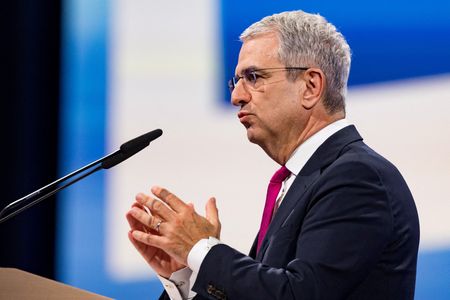By John Revill and Oliver Hirt
ZURICH (Reuters) -Nestle has fired CEO Laurent Freixe after just a year in the job for concealing a romantic relationship with a subordinate, throwing the Swiss food giant into a leadership crisis that compounds a share price slump and slowing sales.
Freixe is replaced by Nespresso chief Philipp Navratil, 49, a rising star at the world’s largest food company, as it struggles to deal with the impact of U.S. tariffs, a darkening global economic outlook and dwindling investor confidence after years of underperformance.
Laying bare wider tensions, Tuesday was a whipsaw day for global consumer companies as Japan’s Suntory parted with its CEO and Kraft Heinz announced a split and activist investor Elliott Management called for a turnaround at PepsiCo.
“The loss of two CEOs and a chairman in a year is of historic proportions for Nestle,” said Ingo Speich, head of Corporate Governance and Sustainability at Deka, a top-30 Nestle investor.
“The new CEO needs to fix the business model and bring volumes back. He needs to do better M&A and focus more on emerging markets.”
Freixe, a 63-year-old Frenchman, was sacked just over a year after his predecessor Mark Schneider was ousted for failing to turn Nestle around.
The company also said in June that Paul Bulcke, CEO from 2008 to 2016, will step down as chair in April 2026 and be replaced by Pablo Isla, a former CEO of Spanish fashion retailer Inditex.
Freixe’s dismissal follows an investigation into an undisclosed romantic relationship with a direct subordinate that breached Nestle’s code of business conduct, Nestle said late on Monday.
Shares in the maker of Nescafe instant coffee and KitKat chocolate bars closed 0.7% lower in Zurich, paring earlier losses when the stock fell as much as 3.6%.
SPEAK UP
The company said concerns about a possible relationship were first raised by staff via the company’s internal reporting channel Speak Up, although an initial investigation was unsubstantiated.
Freixe initially denied the relationship to the board, a company spokesperson said.
When staff concerns persisted, Nestle ordered an investigation, overseen by Bulcke and Isla, with the support of Swiss lawyers Baer & Karrer, Nestle said.
The report was completed in recent days, leading to a board meeting and Freixe’s dismissal on Monday.
Freixe, who spent 39 years with Nestle, will receive no exit package following his departure, the company told Reuters.
In a short statement, Bulcke thanked Freixe for his service at Nestle, but said the dismissal was a “necessary decision”.
His removal adds to a list of chief executives forced to resign following investigations into their relationships with colleagues.
Energy giant BP’s former CEO Bernard Looney and McDonald’s CEO Steve Easterbrook were both removed for failing to disclose relationships.
Swiss financial news website Inside Paradeplatz reported that Freixe met the woman in 2022, before he became CEO, when he was head of Nestle’s Latin America business.
Freixe was not immediately available to comment when contacted via email. The female subordinate, whose identity has not been made public, left Nestle over the summer, a company spokesperson said.
Swiss law does not prohibit relationships between senior executives, although most large companies – including Nestle – have internal codes of conduct that require them to be disclosed. If there is a conflict of interest, one of the people has to switch roles.
At Nestle, direct reporting relationship between family members, partners and close associates is not allowed, while indirect reporting lines are assessed on a case-by-case basis.
Corporate governance expert Peter V Kunz, from the University of Bern, said he was not familiar with Nestle’s rules, but that requirements at most public companies were broadly similar.
“In this respect, Mr Freixe’s behaviour – regardless of whether it was legal or not – seems to me to be simply stupid and incomprehensible in this day and age,” Kunz told Reuters, adding that he did not think investors had grounds for legal action against Nestle.
STABILITY SOUGHT
As price-sensitive consumers have turned to cheaper alternatives, Nestle’s shares, a bedrock of the Swiss stock exchange, have lost almost a third of their value over the past five years, underperforming European peers.
Freixe’s appointment failed to halt the slide, with the company’s shares shedding 17% during his leadership, disappointing investors.
One top-20 Nestle investor said Freixe had been a disappointment and that bringing in Navratil was an opportunity for a more ambitious overhaul.
The new CEO needs to slim down the company, cut costs and above all reduce the headcount, said the investor who declined to be named due to the sensitivity of the matter. It was also crucial that the company raise organic growth to boost volumes.
In July, Nestle launched a review of its underperforming vitamins business that could lead to the divestment of some brands after first-half sales volumes missed expectations.
AJ Bell investment director Russ Mould said that the company would likely face a period of uncertainty.
“While Navratil is also an internal appointment, he will want to put his own mark on strategy and that suggests the clock could be reset when it comes to the turnaround plan,” he said.
(Writing by John Revill, Dave Graham and Louise Heavens; additional reporting by Paolo Laudani; Editing by Andrea Ricci, Muralikumar Anantharaman, Louise Heavens, Emelia Sithole-Matarise and Barbara Lewis)











